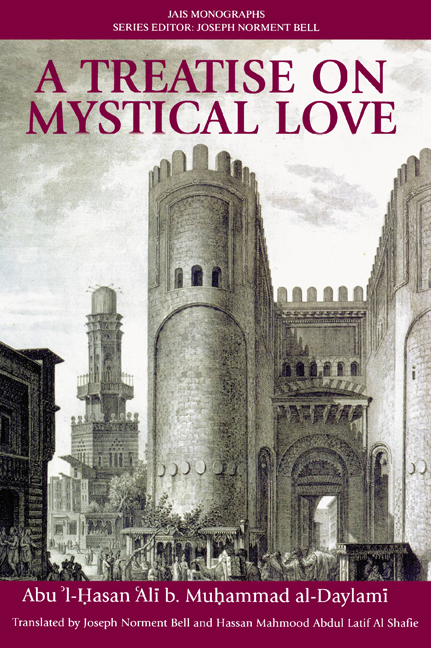Book contents
- Frontmatter
- Contents
- Dedication
- Acknowledgments
- Introduction
- Manuscript title page in English
- Author’s Preface
- I On the Chapters of the Book
- II May the Word cIshq Be Applied to Love for God and from God?
- III Preliminary Considerations
- IV On the Word Love, Its Derivation, and Its Meanings
- V On the Origin and Beginning of Love and Eros
- VI On the Essence and Quiddity of Love
- VII On the Diverse Views People Hold about Love
- VIII On the Description and Character of Eros
- IX On Praiseworthy Love
- X On Those Who Disparaged Love for Some Cause
- XI On the Effects of Love [and Eros] and Their Signs and Symptoms
- XII On the Signs of Love, Including the Sayings of Unimpeachable Spiritual Authorities among the Mystics and the Righteous
- XIII On the Classification of Love according to Our Opinion
- XIV On the Signs of God’s Love for Man
- XV On the Explanation of the Signs of Man’s Love for God
- XVI On the Signs [of the Love] of Those Who Love One Another in God
- XVII On the Love of the Elite among Believers
- XVIII On the Love of the Commonality of Muslims
- XIX On the Love of All Other Animate Beings
- XX On the Meaning of the Word Shahid
- XXL On the Definition of the Perfection of Love
- XXII On Those Who Died of Natural Love
- XXIII On Those Who Killed Themselves for Love
- XXIV On the Death of Divine Lovers
- Bibliography
- Index of Persons, Peoples, and Places
XIX - On the Love of All Other Animate Beings
Published online by Cambridge University Press: 01 October 2020
- Frontmatter
- Contents
- Dedication
- Acknowledgments
- Introduction
- Manuscript title page in English
- Author’s Preface
- I On the Chapters of the Book
- II May the Word cIshq Be Applied to Love for God and from God?
- III Preliminary Considerations
- IV On the Word Love, Its Derivation, and Its Meanings
- V On the Origin and Beginning of Love and Eros
- VI On the Essence and Quiddity of Love
- VII On the Diverse Views People Hold about Love
- VIII On the Description and Character of Eros
- IX On Praiseworthy Love
- X On Those Who Disparaged Love for Some Cause
- XI On the Effects of Love [and Eros] and Their Signs and Symptoms
- XII On the Signs of Love, Including the Sayings of Unimpeachable Spiritual Authorities among the Mystics and the Righteous
- XIII On the Classification of Love according to Our Opinion
- XIV On the Signs of God’s Love for Man
- XV On the Explanation of the Signs of Man’s Love for God
- XVI On the Signs [of the Love] of Those Who Love One Another in God
- XVII On the Love of the Elite among Believers
- XVIII On the Love of the Commonality of Muslims
- XIX On the Love of All Other Animate Beings
- XX On the Meaning of the Word Shahid
- XXL On the Definition of the Perfection of Love
- XXII On Those Who Died of Natural Love
- XXIII On Those Who Killed Themselves for Love
- XXIV On the Death of Divine Lovers
- Bibliography
- Index of Persons, Peoples, and Places
Summary
The author of this book said: The love of the other animals is a closeness of natures and the inclination of like to like, as is seen in the close companionship of livestock, wild animals, and birds. Thus one hears a camel grumble and utter cries of longing when he must leave his companions in the herd, or a horse neigh when he must leave his close companion whom he is accustomed to be with at the manger. The same is the case with other livestock and beasts of burden. [226] As for the closeness of dogs to their masters, it is so well known we hardly need mention it. Indeed Buzuijmihr said: “I have learned from everything a moral lesson, even from the dog, the crow, and the cat.” When he was asked, “What have you learned from the dog?” he replied: “His closeness to his masters.”
It is related that Solomon the son of David, peace be upon him, was sitting in his assembly hall when he saw two sparrows. One of them said to the other, “Will you be contrary with me? Even if you were to order me to pick up Solomon's assembly hall with my beak, I would obey you and do it.” Solomon laughed and, calling to them, said to the male, “Are you the one who said such and such?” “Yes, O Prophet of God,” he replied. “What brought you to say such a thing?” Solomon asked. “O Prophet of God,” the sparrow answered, “a lover is not to be blamed.”
I heard one of our teachers say: “I was out in the desert, and I saw a camel that had twisted his head to the right and would not turn it [227] in any other direction. So I asked the camel driver, ‘What is the matter with this camel that he keeps his head turned to the right?’ ‘I had him tied in line with a female,’ he answered, ‘but then [a man came] and untied her and went off with her to the right. The camel turned his head after her, and he has kept it turned in that same direction ever since.’”
- Type
- Chapter
- Information
- A Treatise on Mystical Love , pp. 160 - 162Publisher: Edinburgh University PressPrint publication year: 2020



